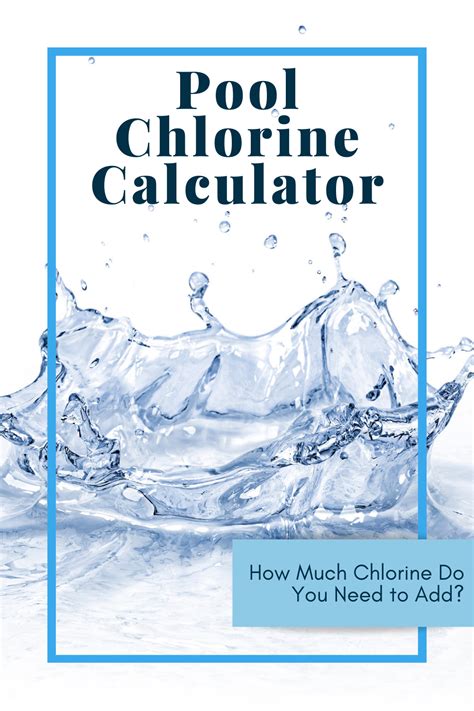Your Pool's Secret Weapon: The Chlorine Calculator
Maintaining a sparkling, healthy swimming pool isn't child's play. It requires careful attention to water chemistry, and one of the most crucial aspects is chlorine levels. Getting it wrong can lead to cloudy water, algae blooms, or even health risks. This is where the chlorine calculator becomes your secret weapon, transforming pool maintenance from a daunting task into a manageable process. This article will explore the importance of chlorine calculators, how they work, and why they're essential for every pool owner.
What is a Chlorine Calculator?
A chlorine calculator is a tool, often available online or as a mobile app, that helps pool owners determine the precise amount of chlorine needed to sanitize their pool water. Instead of relying on guesswork or outdated methods, a calculator utilizes key variables to provide a tailored recommendation. This ensures efficient sanitization while minimizing chemical waste and preventing imbalances that could harm swimmers or damage pool equipment.
Why is Accurate Chlorine Calculation Important?
Maintaining the correct chlorine levels is paramount for several reasons:
- Sanitation: Chlorine is the primary sanitizer in most pools, killing bacteria, viruses, and algae that can make the water unsafe for swimming. Too little chlorine allows these contaminants to thrive, leading to unhealthy swimming conditions.
- Water Clarity: Proper chlorine levels are essential for crystal-clear water. Insufficient chlorine results in cloudy water, while excessive chlorine can lead to irritation and damage to pool surfaces.
- Equipment Protection: Maintaining balanced water chemistry, including appropriate chlorine levels, protects your pool equipment from corrosion and premature wear. Imbalanced water can damage pumps, filters, and other components.
- Swimmer Safety: Proper sanitation is vital for preventing waterborne illnesses. Accurate chlorine levels contribute to a safe and healthy swimming environment for everyone.
How Does a Chlorine Calculator Work?
Most chlorine calculators require you to input several key variables, including:
- Pool Volume: This is usually calculated based on the pool's dimensions (length, width, and average depth). Many calculators offer built-in volume calculation tools.
- Current Chlorine Level: This is determined using a reliable test kit. Accurate testing is crucial for the calculator to provide accurate recommendations.
- Desired Chlorine Level: This is the target chlorine concentration you aim to maintain, typically within the recommended range for your pool type.
- Type of Chlorine: Different chlorine products have varying concentrations, so specifying the type you're using is essential.
Based on this input, the calculator performs calculations to determine the amount of chlorine needed to achieve your desired level.
What are the Different Types of Chlorine Calculators?
You'll find various types of chlorine calculators:
- Online Calculators: Many websites offer free chlorine calculators. Simply input the required data and get instant results.
- Mobile Apps: Several apps are available for smartphones and tablets, providing convenient on-the-go calculation.
- Pool Supply Store Calculators: Some pool supply stores offer in-store calculators or can assist you with the calculations based on your test results.
What are the Common Mistakes to Avoid When Using a Chlorine Calculator?
- Inaccurate Measurements: Using inaccurate measurements for pool volume or chlorine levels will lead to incorrect recommendations. Always use reliable testing methods and accurate measurements.
- Ignoring Other Water Chemistry Factors: Chlorine is just one component of balanced pool water. Factors like pH, alkalinity, and calcium hardness also impact chlorine effectiveness. Ignoring these can lead to inaccurate calculations.
- Over-Chlorination: Adding too much chlorine can lead to irritation, damage to pool surfaces, and chemical waste. Always follow the calculator's recommendations.
- Using the Wrong Type of Chlorine: Different chlorine products have varying strengths. Using the incorrect type will lead to inaccurate calculations.
How Often Should I Use a Chlorine Calculator?
The frequency of using a chlorine calculator depends on various factors, including pool usage, weather conditions, and water loss. Regular testing (at least once a week) and subsequent calculations are recommended to maintain consistent chlorine levels.
Are there Alternatives to Using a Chlorine Calculator?
While chlorine calculators offer convenience and accuracy, some pool owners might opt for alternative approaches like relying on experience or following general guidelines. However, these methods are less precise and increase the risk of imbalances.
Conclusion
Using a chlorine calculator is a proactive approach to pool maintenance. It ensures you have the correct chlorine levels, promoting a safe, clean, and enjoyable swimming experience. Remember, accurate testing and understanding your pool's specific needs are crucial for effective pool management. By utilizing a chlorine calculator responsibly, you're investing in the longevity of your pool and the well-being of your swimmers.

